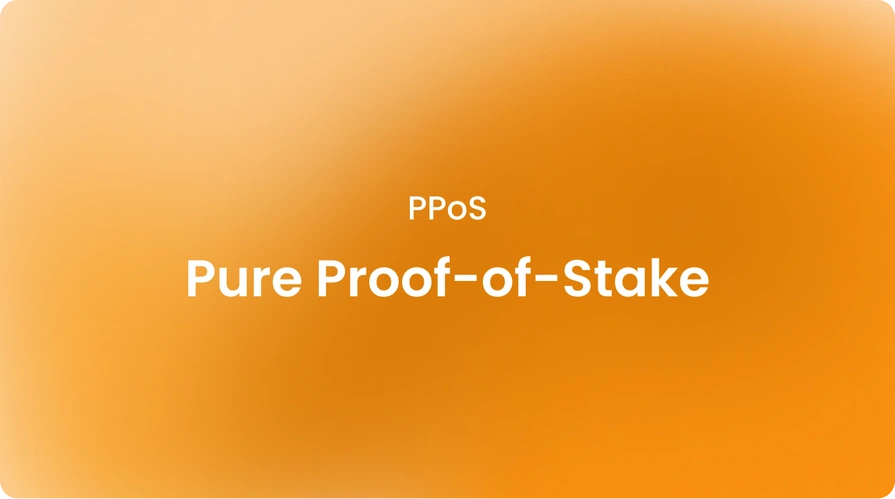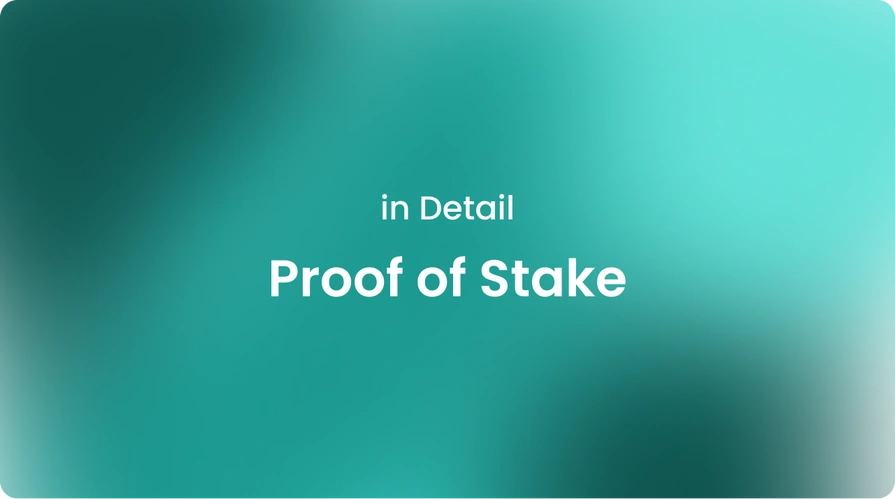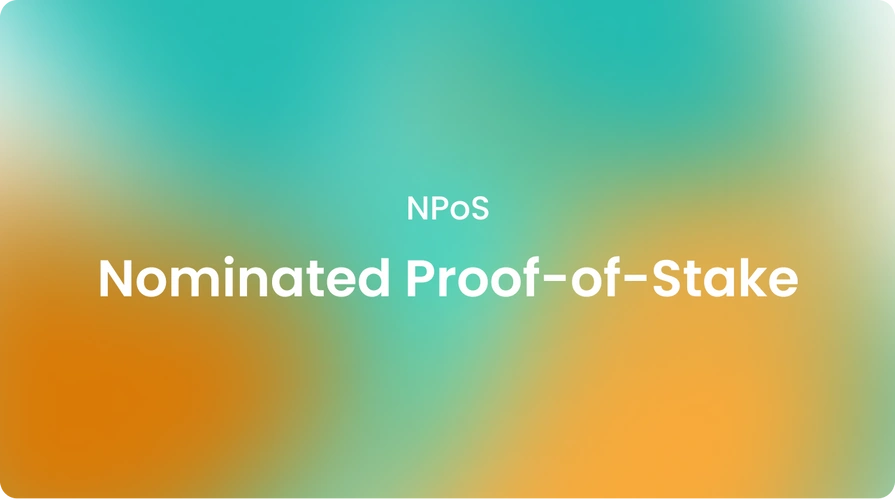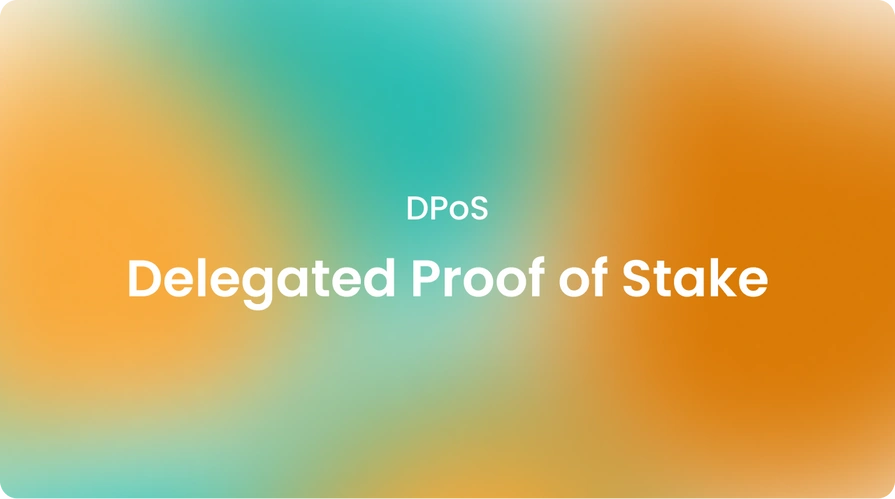|technology, knowledgehub
What Is Pure Proof-of-Stake (PPoS)?

Pure proof-of-stake (PPoS) is an emerging consensus mechanism for blockchains that aims to provide a more democratic and energy-efficient alternative to proof-of-work (PoW).
As the name suggests, PPoS reaches consensus solely based on a node's stake in the network without requiring computationally-intensive mining.
In this article, we will delve into how PPoS works, its key advantages and disadvantages compared to other consensus models, and whether it represents a better solution than traditional proof-of-stake (PoS) and its types, such as DPoS and NPoS.
By the end, you'll have a solid understanding of this promising new blockchain consensus approach. Let’s start to explore the pure proof-of-stake blockchain consensus mechanism in detail!
How does pure proof-of-stake work?
PPoS arrives at a consensus based purely on stake and nothing else. The selection of a blockchain node to propose and validate the next block is directly proportional to the amount of native cryptocurrency ("stake") it holds.
The total stake weighted by time, or "TWSTAKE," represents the node's validating power in every account on a PPoS blockchain. When it's time to propose a new block, the protocol randomly selects a node based on the overall TWSTAKE distribution across all accounts.
The selected node then broadcasts a proposed block to the network. Other nodes validate this block by verifying the validity of its transactions and ensuring they have not been previously confirmed. Once the block passes this validation process successfully, it adds to the permanently growing blockchain.
As an added security measure, PPoS may require nodes to sign blocks with a certain percentage of overall stake (e.g., >66%) to finalize them on the ledger. This makes it difficult for minority attackers to alter the consensus history.
Cryptobunq is a crypto-friendly digital bank offering various services in crypto and blockchain that can help securely participate in PPoS networks.
With services like batch payments, custody and wallet, and more solutions, Cryptobunq allows easy integration and participation in blockchain technology with maximum security. You can check out our case studies and follow CBQ blogs for more details about blockchain!
What are the advantages and disadvantages of PPoS?
PPoS offers several advantages over consensus-based protocols like PoW:
Greater decentralization
Any blockchain node can participate as a validator proportionate to its holdings. This is more inclusive than PoW, which increasingly favors those with specialized crypto mining hardware.
Near-zero energy usage
Validating blocks does not require intensive computation like mining. PPoS validates based purely on stake, using minimal resources.
Fast transactions
PPoS consensus allows for much quicker confirmation of transactions compared to PoW networks, as it eliminates mining overhead.
However, PPoS also presents some disadvantages:
Centralization risk
Over time, as large stakeholders come to own most of the available crypto coins, they can begin to centralize influence over the network.
Nothing is at stake
Because validators are not "betting" resources to participate, there is no real cost to voting on multiple forks of the blockchain. This can undermine security.
Long-range attacks
A validator holding a large portion of coins could theoretically rewrite significant parts of the historic blockchain ledger. Proper safeguards need enforcing.
To sum up, while PPoS improves efficiency and scalability, it can concentrate power in the hands of those with the most stake if not carefully designed. Therefore, it is better to work with a secure crypto service provider to avoid these types of risks.
Cryptobunq is here for you with secure crypto and blockchain services in this regard. You can easily integrate our expert solutions into your individual and business projects for prospective business growth. Furthermore, you can adapt to the future to surpass your competitors with the power of blockchain!
What is the difference between proof-of-stake and pure proof-of-stake?
The main difference between proof-of-stake and pure proof-of-stake lies in how blockchain nodes are selected for block production.
In PoS, validating nodes are usually required to "lock up" a minimum amount of their coins for a certain period. They then get the chance to produce new blocks based on a hybrid of various factors like total stake, randomness, and time elapsed.
In contrast, PPoS solely weights block selection as a random process based on nodes' total stake (TWSTAKE) without any additional variables or tiebreakers. There are no lockups or tiebreakers based on additional variables.
Any node can access PPoS more easily and with greater simplicity, which is a potential benefit. However, it also increases risks like nothing at stake that PoS protocols try to mitigate through supplementary rules.
PPoS aims for a more straightforward deployment of Nakamoto's original stake-based consensus vision. In contrast, PoS systems argue their extra complexity better safeguards decentralization long-term.
Is pure proof of stake better than proof of stake?
Whether PPoS constitutes an improvement over classic PoS depends largely on one's priorities. By removing complexity, PPoS favors pure random selection based solely on the total stake. This lowers the bar for participation.
However, certain PoS variants arguably take a more robust approach to safeguarding decentralization in the long run through additional mechanisms like lockups, bonds, and committees.
From a resource efficiency standpoint, PPoS matches PoS with near-instant transactions using negligible energy. But PoW still has a clear advantage in Sybil resistance due to sunk mining costs.
The winner relies on how well individual implementations address factors like nothing at stake and centralization over the network's lifespan.
PPoS vs. Proof-of-Work
Compared to energy-intensive proof-of-work, PPoS provides near-instant transactions and confirmations while using minimal resources. According to a 2019 study, blockchain proof-of-stake PoS protocols reduce energy use by 99.95% versus PoW.
For users, this translates to PPoS networks being much quicker, cheaper, and more sustainable to use on a daily basis. However, PoW has arguably stronger immunity to nothing-at-stake problems due to miners permanently "burning" resources with each block solution.
Additionally, it avoids centralization risks from the consolidation of coin ownership over time. You can check out “Proof of work vs. proof of stake” to better understand the difference between each consensus mechanism.
To sum up, in the long run, PPoS advocates argue its easier accessibility and ecological friendliness will outweigh PoW's short-term security strengths as blockchain adoption grows. But PoW still dominates the largest networks currently.
PPoS vs. Delegated Proof-of-Stake
Delegated proof-of-stake (DPoS) introduces representative block producers similar to political democracy. Stakeholders elect validators, improving direct accountability.
Comparatively, PPoS has no special class of validators; any node proportional to its stake can produce new blocks. This removes a layer of indirection, but DPoS supporters argue the extra oversight reduces centralization pressures.
In terms of performance, DPoS protocols can confirm transactions in just 1 second, which is vastly faster than classical PoS networks. But some argue that DPoS ends up concentrating power in the hands of a small committee of block producers.
PPoS promises greater immediate participation. But the DPoS may distribute influence more widely long-term through its representative democratic process if the election remains fair and competitive.
PPoS vs. Bonded Proof-of-Stake
Bonded Proof-of-Stake (BPoS) is similar to classic PoS but adds a "bond"—validators must lock up collateral that can be slashed for misbehavior. This bond deters attacks by making them costly.
Comparatively, in PPoS, blockchain nodes also have native crypto tokens at stake, but there are no explicit bonds that can be slashed. This potentially raises risks, like nothing-at-stake attacks.
However, BPoS requires more complex bond management, which could represent an extra barrier to entry. However, majority-stakeholder consensus provides security in PPoS, maintaining a simpler user experience.
While BPoS adds an extra deterrent layer, PPoS aims to be more immediately accessible to average users through its simpler up-front design. Long-term, the impact of these tradeoffs is still up for debate.
In the coming years, real-world usage will determine if PPoS provides a smoother experience without compromising security or if alternative PoS upgrades like bonding and committee structures better serve sustainability long-term.
For now, both remain works in progress to scale decentralized blockchain networks. If you need a partner for your diverse crypto and blockchain needs, Cryptobunq is here to help.
We offer customized solutions for your projects from tokenization to node as a service, crypto exchange API to crypto checkout and invoicing solutions with security. Contact us today and explore the benefits CBQ offers!













